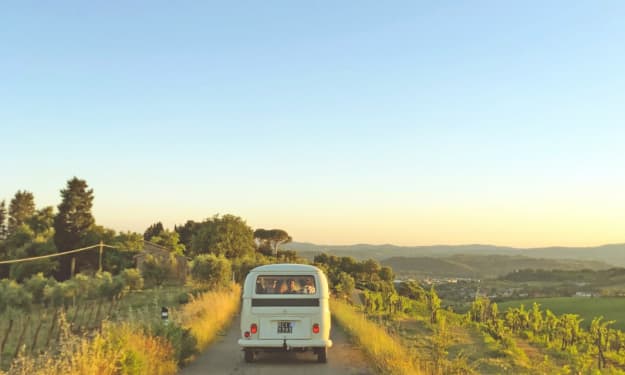5 Tips to Prepare for Your First Big Hike
Prepare for your first big hike after quarantine

Pushing limits and boundaries seems to be as innate to being human as the need for answering questions not yet understood. It is this need that has put man on the moon and led to the understanding of existence before there was history. Every individual seems to possess these qualities to some extent. Perhaps you don't have a need to travel space and time, but you do push yourself to do better. Physical endurance is also empowering, which is why there are Olympics and triathlons. There are also those who like to climb mountains.
Maybe your goal isn't to climb a mountain, but you do want to push yourself by engaging in a strenuous hike. Hikes are fascinating adventures in themselves. They allow you to be one with nature, and find out how far you can go and what you can discover about your surroundings as well as yourself.
Before you set out on an intense hiking adventure, it's good to be prepared so you don't inadvertently put yourself in an unwelcome situation. Here are five tips to make your excursion have fewer unexpected surprises.
1. Be Sure Your Gut Is Ready
Almost nothing would be worse than getting miles from civilization on foot and discovering your digestive system wasn't ready for this challenge. While this situation isn't devastating, in the moment it might actually feel like it is.
One way to help protect yourself from such an unwanted surprise is to start preparing your body in advance. You can start building your digestive health before the big hike by regularly taking a supplement that is packed with probiotics, minerals and fiber that will help to prevent digestive upset. A Power Life Foundation Four discount can get you started, and as a bonus, it may also give you a much needed energy boost.
2. Build Your Endurance
It would be a very bad idea to spend your weeks leading up to your big hike in the routine of spending your days at the office and then going home and resting. Your body needs to be in shape so you don't find yourself in a situation where you get halfway through the hike but your legs start to give out in exhaustion.
Ideally, you'll want to start training your body 8 weeks before your trip. Your body needs time to be conditioned for the hike. Not only do you need to start out by walking regularly, but you need to walk through different types of terrain with varying degrees of inclines. You also need to keep a backpack strapped to your back so your back can adjust to carrying the extra weight. Start by carrying a few pounds, and each week add an additional pound. Whether you use actual weights or items you will actually use is up to you.
If you plan on taking your dog with you, your pet needs to be conditioned, too. Believe it or not, a dog can and will become too exhausted to make it back with you if he's not prepared along with you.
3. Buy the Right Protection for Your Feet
You weren't planning hiking in your jogging sneakers, were you? That would be a really bad idea. Your feet and ankles are going to need extra support that sneakers can't provide. If your ankles are prone to injury, choose a hiking boot so your ankles have extra support. Otherwise, something lightweight that can handle the challenging terrain should be fine.
It's also important to compare shoes. Different shoes will be made for different terrain. Buy them in person, so you can be sure they fit well. You won't want any foot movement, because if your feet are sliding around, you're asking for blisters. You also don't want them too tight as they could restrict circulation in your feet.
4. Gear You Don't Want to Forget
Many people are gear people, meaning they love all the extra gear that comes with their hobbies or sports. Whether you're a gear person or not, for hiking, you'll need gear for different situations you could encounter.
Assuming your trip is a day trip only, and you aren't camping and preparing multiple meals, here are the necessities you need to bring, at minimum:
Snacks and at least one meal in case you are out longer than planned.
Plenty of water.
A compass, because it's easy to get turned around.
A first-aid kit.
A multi-tool with a knife.
A map of the trails you are hiking.
A flashlight with working batteries and back-up batteries.
Sun protection, whether it's a hat or sunscreen if you aren't covering your arms and legs.
A lighter.
An extra set of clothes, in case you get wet.
A compact umbrella, in case it rains.
Each item on this list can be as simple or as high-tech and expensive as you prefer. It really doesn't matter as long as you have it. Each person with you should have the same items because if you get separated, you having the first-aid kit isn't going to do them any good a mile away.
5. Be Prepared for Wildlife
A lot of people don't consider this step, but it's a good idea to know what type of wildlife you may encounter on your hike. Will there be bears, cougars or poisonous snakes? If it is possible that you could encounter any of these, or other animals not mentioned, even rabid skunks, you need to know what to do when you encounter them.
Are you going to run? Or are you going to stand your ground and stretch out your arms so you can appear larger? What other options might you have for your particular animal? And if a snake bites you, knowing what kind of snake it was will help you decide how fast you need to get back to civilization, and what you can do in the meantime to reduce the effects of its venom.
There is a lot to consider when leaving the safety of your neighborhood and venturing out into unknown territory. But, it's also exciting and rewarding. Talk to other experienced hikers and see what tips they can offer you. Everyone has a trail story to share, and soon you will, too.






Comments
There are no comments for this story
Be the first to respond and start the conversation.